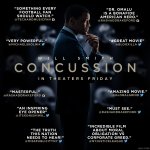I’m not a movie reviewer or a doctor. Like many of you, I’m a football fan, albeit one that often looks at professional football issues with a public relations eye.
To me, there’s little that compares to the excitement of game days, so when statistics about the impact concussions have on athletes’ brains, I cringe, knowing that many of the men for whom we cheer each week may have less-than perfect qualities of life later. Like many that work in and around the sports industry, I looked forward to, if that’s the right sentiment, to seeing the motion picture, Concussion, which opened in theaters Christmas Day.
 Much has been written about the movie, Dr. Bennet Omalu’s research and discovery of chronic traumatic encephalopathy—CTE — as well as long-term effects that head trauma has on living football players’ brains. (Actor Will Smith played Omalu brilliantly.)
Much has been written about the movie, Dr. Bennet Omalu’s research and discovery of chronic traumatic encephalopathy—CTE — as well as long-term effects that head trauma has on living football players’ brains. (Actor Will Smith played Omalu brilliantly.)
The movie doesn’t break new ground. We previously learned that 96 percent of players tested were posthumously diagnosed with CTE. Is there someone to blame? We know that these are athletes that will do most anything to stay in a game regardless of how many hits they take.
The NFL is concerned, however. And it should be. Not just because of the numbers, but because we’ve been enlightened about the lengths it went to keep detrimental information about concussions from seeing the light of day. And as bitter as the taste your mouth when you see verbiage about those efforts, who could blame the league? Billions of dollars are at stake. If players are scared straight and decide not to play and if fans are suddenly turned off by the violent nature of the game, an industry collapses. From PBS’ Frontline’s League of Denial to 60 Minutes to Time Magazine and Mike Freeman’s Two Minute Warning, the NFL has been scrunched further into a corner each time new findings about concussions are released. As if the league didn’t have public relations issues without them. But with each revelation, the games went on with fans traveling, tailgating and immersing themselves in their teams.
I walked out of the movie theater thinking something different than I anticipated about what I saw. Concussion may actually be good for the NFL in the long run if plays its public relations cards right. It’s already moving in a positive direction with equipment and rule changes to prevent the type of hits fans used to celebrate. It’s not perfect (see Case Keenum), but it’s better.
If the NFL wants to win this round, it has to stop insinuating that there’s no scientific proof that repeated hits to the head are not harmful. It is true that CTE can currently only be detected in deceased individuals, but 87 out of 91 players diagnosed was discovered on autopsy tables, not in a movie studio. If I’m Roger Goodell, I thank Sony and Omalu for helping the NFL better inform its players, medical personnel and fans and reiterate (and SHOW) that it’s taking action to make the game safer.
I didn’t see Concussion as the 2-hour takedown of the NFL that some suggested. I, instead, saw a movie based on a true story that informs, educates and yes, as movies do, entertain.
Omalu is driven to find out why football players that endure forceful hits to the head develop a disease that manifests itself in life as a combination of depression, insomnia, aggression and dementia, to name a few. He learned about this American sport later in his life than most of us, but in the movie and in interviews, he says that he appreciates the artistry and athletic dynamics of the game. Based on what Omalu discovered, he’s trying to make it safer while he searches for answers about how to stem the deterioration. The league must embrace the education and move forward, and it can, with a better NFL.
The game is already different than we knew it 10 and 20 years ago, and it will evolve as we learn how to keep athletes safer on the field. That’s not a bad thing. Even with the changes, magnificently athletic individuals still play a game that people want to watch and cheer. All will ensure the league’s life and business.
The discussion started months ago and with Concussion’s release, it will continue. If the NFL listens and learns from science, its responses will help grow the sport going forward. It will grow differently than we’ve witnessed in the past, but in my opinion, it will still be America’s favorite sport.
©Gail Sideman, PUBLISIDE.com, 2015
###